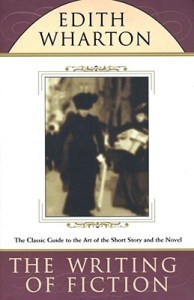Edith Wharton on llluminating Incidents
When I was moaning about plot challenges recently on Facebook, my friend Jen Groff suggested that when I figure this out, I should run a workshop called “Plot for Poets.” I haven’t figured it out, and I’m not running a workshop, but I like her title and I’m reading Edith Wharton’s The Writing of Fiction, which might be the text for this class. Edith Wharton wrote a lot of great fiction in the same era that her friend Henry James was also writing novels and trying to figure out the aesthetics of a form that could seem wayward and bulky. But I don’t see as much heavy lifting, the marks of trying to figure out rules, in Wharton’s fiction as I do in James’s. (Not that I’ve read that much, let’s be clear: I lose patience.) Edith Wharton was known for grace, reticence, and heroic strength in a life both privileged and trying, and you find all of this in her novels. Her slim book on writing could be placed on the elegant end of how-to guides. She doesn’t discuss plot in terms of lines or triangles, but as light, which might radiate back from illuminating incidents and an end that seems inevitable. Not just characters, but place, should contribute. “The impression produced by a landscape, a street or a house, should always, to a novelist, be an event in the history of a soul.”
“No conclusion can be right which is not latent in the first page.” I’m playing with images in the first and last chapters, realizing that I have pine boughs on page one, and can slip in evergreen nicely at the end. This echoes what Blake Snyder says in Save the Cat: The Last Book on Screenwriting You’ll Ever Need which I’m also finding useful on plot. But of course since it’s about screenwriting, discourse is left out. Like most of us twenty-first century writers, I can lean too much on dialogue, which Wharton warns can be a method that is “wasteful” and “roundabout,” best used by those who dare start in the middle and aren’t tempted to use conversation as a setup to let readers in on things they need to know. Wharton mentions Trollope’s “least good tales, rambling “on for page after page before the reader, resignedly marking time, arrives, bewildered and weary at a point to which one paragraph of narrative could have carried him.”
I’m not sure I can or want to with use dialogue just as she advises – “sparingly as the drop of condiment which flavors a whole dish” –but she gives much to ponder as I trim to bring out a shape. Wharton writes that the length of a novel must be determined by its subject, but when composing, we shouldn’t forget that “one should always be able to say of a novel: ‘It might have been longer,’ never: ‘It need not have been so long.’” Okay, back to paring down.












